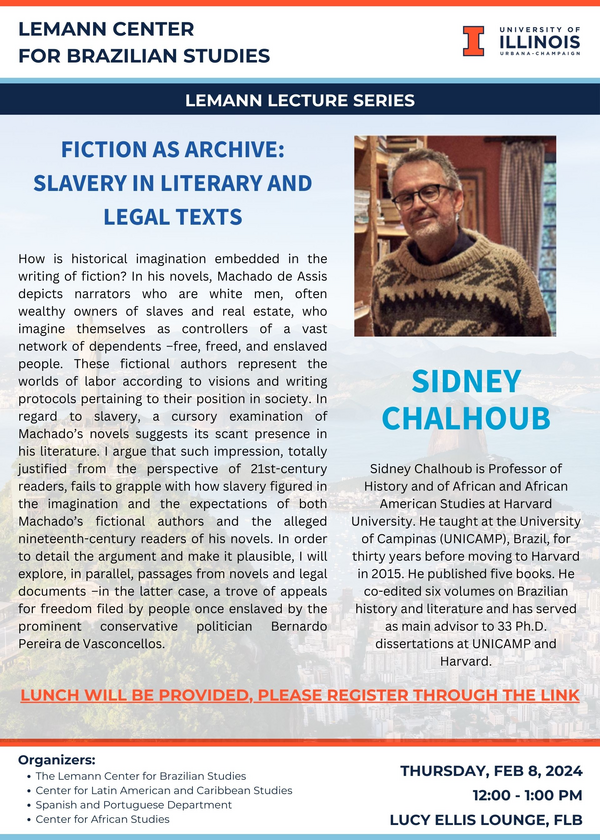
Fiction as Archive: Slavery in Literary and Legal Texts
- Event Type
- Lecture
- Sponsor
- The Lemann Center for Brazilian Studies, Center for Latin American and Caribbean Studies, Spanish and Portuguese Department and Center for African Studies
- Location
- Lucy Ellis Lounge, FLB
- Virtual
- Join online
- Date
- Feb 8, 2024 12:00 - 1:00 pm
- Speaker
- Sidney Chalhoub is Professor of History and of African and African American Studies at Harvard University. He taught at the University of Campinas (UNICAMP), Brazil, for thirty years before moving to Harvard in 2015. He published three books on the social history of Rio de Janeiro: Trabalho, lar e Botequim (1986), on working-class culture in the early twentieth century; Visões da Liberdade (1990), on the last decades of slavery; and Cidade febril (1996), on tenements and epidemics in the second half of the nineteenth century. He also published Machado de Assis, historiador (2003), about the literature and political ideas of the most important Brazilian novelist of all times, and A força da escravidão (2012), on illegal enslavement and the precariousness of freedom in nineteenth-century Brazil. He co-edited six volumes on Brazilian history and literature and has served as main advisor to 33 Ph.D. dissertations at UNICAMP and Harvard.
- Registration
- Register here for the event and for the lunch
- Contact
- Lemann Center
- lemann@illinois.edu
- Views
- 126
- Originating Calendar
- Center for African studies - Outreach Calendar
How is historical imagination embedded in the writing of fiction? In his novels, Machado de Assis depicts narrators who are white men, often wealthy owners of slaves and real estate, who imagine themselves as controllers of a vast network of dependents –free, freed, and enslaved people. These fictional authors represent the worlds of labor according to visions and writing protocols pertaining to their position in society. In regard to slavery, a cursory examination of Machado’s novels suggests its scant presence in his literature. I argue that such impression, totally justified from the perspective of 21st-century readers, fails to grapple with how slavery figured in the imagination and the expectations of both Machado’s fictional authors and the alleged nineteenth-century readers of his novels. In order to detail the argument and make it plausible, I will explore, in parallel, passages from novels and legal documents –in the latter case, a trove of appeals for freedom filed by people once enslaved by the prominent conservative politician Bernardo Pereira de Vasconcellos.
Lunch Will be provided. Register here